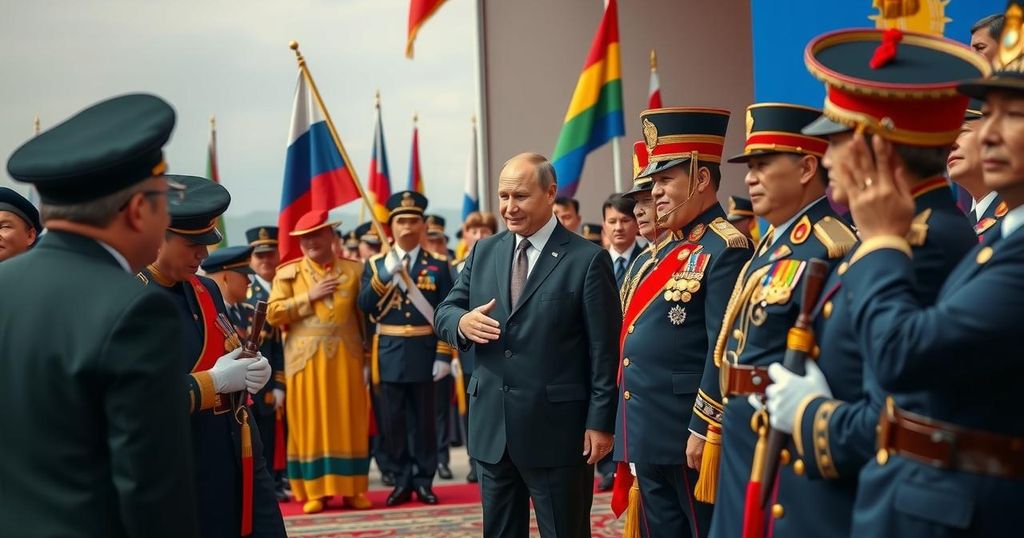Putin’s High-Profile Visit to Mongolia Amid War Crimes Allegations

Russian President Vladimir Putin visited Mongolia amid war crimes accusations, engaging with President Khurelsukh and emphasizing strong bilateral ties. Despite international calls for his arrest, Mongolia chose to welcome him, raising concerns about its compliance with ICC obligations. Local protests were suppressed, illustrating the state’s delicate balancing act between Russia and China.
On Monday night, Russian President Vladimir Putin arrived in Ulaanbaatar to commence a highly publicized visit, characterized as a demonstration of resistance against international entities urging his detention amid accusations of war crimes related to the invasion of Ukraine. Following his arrival, he engaged in discussions with Mongolian President Ukhnaagiin Khurelsukh at the storied Sukhbaatar Square, where he lauded Mongolia’s “respectful attitude” and expressed a mutual alignment on various international matters.
Putin faces an arrest warrant from the International Criminal Court (ICC) for the alleged unlawful deportation of Ukrainian children during the conflict that initiated in 2022. Ukrainian Prosecutor General Andriy Kostin criticized Mongolia for allowing the visit, stating, “Today, Putin humiliated Mongolia by cynically using it as a bargaining chip in his geopolitical game.” The European Union expressed regret over Mongolia’s failure to uphold its obligations under the Rome Statute that established the ICC.
Despite Ulaanbaatar’s challenging diplomatic position, including its geographical constraints between China and Russia, the United States acknowledged the complexity of the situation but encouraged Mongolian leaders to advocate for the rule of law. A State Department spokesperson remarked on the importance of maintaining international legal standards. In Mongolia, public sentiment appears to favor maintaining cordial relations with both neighboring powers, as many citizens view the arrest of Putin as inconceivable.
Genghis Khan Square was adorned with Russian and Mongolian flags for Putin’s visit, marking the 85th anniversary of a significant victory over Japan during World War II. Although there were attempts at protests during his visit, authorities maintained tight security, limiting dissent. Activists faced police actions for attempting to voice their opposition to the Russian leader, illustrating the delicate balance Mongolia seeks to maintain in its international relations.
The context of President Putin’s visit to Mongolia is rooted in the geopolitical tensions exacerbated by Russia’s aggressive actions in Ukraine. Despite the ICC warrant, Mongolia’s historical alliances and economic dependencies on both Russia and China complicate its diplomatic stance. Since gaining independence from Soviet influence, Mongolia has sought to balance relationships with its powerful neighbors while navigating international expectations regarding human rights and legal obligations. This visit underscores the intersections of regional politics and international law, drawing attention to Mongolia’s strategic choices amid global scrutiny.
In summary, President Putin’s visit to Mongolia signifies a complex intersection of diplomacy and international relations, particularly against the backdrop of ongoing accusations of war crimes. Mongolia’s decision to welcome Putin illustrates its desire for stable relations with Russia, despite the ramifications for its international reputation. The responses from international bodies and local activists highlight the tension between national interests and the obligations to uphold international law, leaving Mongolia in a precarious position as it balances these competing pressures.
Original Source: www.channelnewsasia.com








